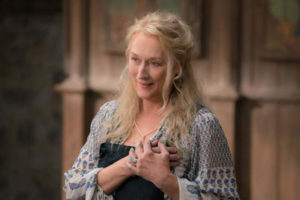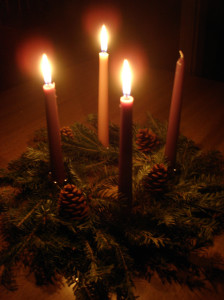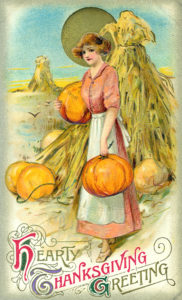For all we talk here about celebrating the ceremony of a day, I know that for a lot of you, for one reason or another, this time of year is not easy. The holidays are hectic, overstimulating, excessively commercialized, and we put so much pressure on ourselves to make them perfect. Not only that, this time of year can more easily dredge up feelings of loneliness and reminders of loss. I’ve been there; I understand. I was there for a bit just last week. It was a week of worry: my mom had been dealing with an infection (she’s better now), the cat seemed not quite right, either; she wasn’t eating as heartily and wasn’t following her usual routines (she’s better and more her usual self now, too), work was not someplace I cared to be, and on top of all this, it was coming on to Thanksgiving and I was feeling like there wasn’t the time to do all I wanted to do to prepare. And then, at the back of my mind and in the core of my heart, was the reminder that Dad wouldn’t be at the table. Our second Thanksgiving since his passing was not feeling much easier than our first.
But Thanksgiving dinner was nice. Just the four of us: my mom, my sister, and Seth and me. At the table, I remembered Dad (I always do; I sit in his seat now at the head of the table––even though we were just four people that’s where my plate was set) and I remembered Grandpa, whose birthday was very often on Thanksgiving.
After dinner, after pie and coffee and after cleaning up the kitchen, we four settled into the living room. Mom wanted to watch a Doris Day movie but she was soon nodding off in her chair, sleeping off her meal, so she was overruled. My sister wanted to watch a new DVD she had just bought: Mamma Mia! Here We Go Again. I know, I know: Mamma Mia!, the 2008 film version of the Benny Andersson & Björn Ulvaeus musical featuring the music of ABBA, is not the most intellectually stimulating film. If you’ve not yet seen the sequel, well, I have news for you: it’s just as dreadful as the original. But that’s part of what we love about these films. They are pure joy and fun and no one enters into a film like this expecting a life-altering experience.
This is probably a good place to tell you that I was not very popular in high school. ABBA’s popularity back then was a bit like soccer’s: hugely popular throughout the world, but here in the States, not so much. And me, I was quite possibly the only Florida member of the ABBA International Fan Club. I had all their records, I knew all their songs, even the obscure ones. I wore ABBA t-shirts and the ABBA International Fan Club Magazine arrived in my mailbox from Europe four times a year. When I was old enough to drive, while other students at my school were blasting Pink Floyd and Blue Öyster Cult out of their car windows, I was the one playing songs like “Waterloo” and “The Name of the Game.” I was never beaten up at school, but I walked a fine line. Most of the kids at Deerfield Beach High School took the high road and just chose to ignore me.
These days, I feel slightly vindicated. There’s not been a lot of Blue Öyster Cult action in these post-high-school days but thanks to the Mamma Mia movies, almost everyone now recognizes “Dancing Queen” as soon as they hear that first roll of the piano keys, and they even know the words. And when a band like Arcade Fire, critical darlings of the independent music scene, release an album like their most recent one, “Everything Now“–– one that is infused with ABBA-inspired harmonies and keyboards––well… I can feel a bit smug about that for all the unpopularity I endured in high school.
Anyway, back to Thanksgiving and back to the movie. And spoiler alert––in case you’ve not yet seen it: Being the kind of movie it is, dripping with joy and happiness, I was surprised that Meryl Streep’s character, Donna, was killed off somewhere between the original and the sequel. And––again, being the kind of movie that it is––I expected all through the film that she would come back, that her death was all a funny misunderstanding and she would show up at her hotel on Kalokairi again and all would be well. But she doesn’t; not quite. At any rate, here we all were on Thanksgiving night, my mom, my sister, and Seth, and then me, off to the side, in Dad’s chair, watching this movie, filled with all this music that I knew by heart and that I could remember my dad sometimes singing along to (he liked to do the oom-pah-pahs in “Super Trouper”)… well, it all came welling up eventually. The worry over Mom and the cat, the feelings of loss, all those emotions. By the baptism scene in the church, with the song “My Love, My Life,”––one of the few songs for which Andersson and Ulvaeus wrote new lyrics for the movie––well… I was a blubbering mess, though I did my best to contain it. I was not sobbing but I was pushing it close, and anyone could steel a glance away from the movie and at my chair to see that it was rocking back and forth, something I didn’t even realize I was doing with my foot until I stopped it, the rocking apparently my last ditch attempt at keeping it together.
And then I got mad at the movie. You do not watch a movie like Mamma Mia! Here We Go Again to wreck yourself and get all emotional. I got mad at the song and I got mad at Benny and Björn for killing off Donna (though I’ve since learnt it was Meryl Streep’s idea, and I can’t stay mad at Meryl). And I got mad at myself for letting another movie make me cry.
But sometimes, this is what the holidays do to us, no matter how strong we feel going in. They push us to the edge of the cliff and dangle us there. It may take a silly film or a visit to a dark church or a perhaps a quiet fireside moment, a walk in the brisk air. But you know what? No one expects you to be happy all the time, least of all me. I’ve said it before: an underlying tenet of this Book of Days is that there is always a seat at the table for Death. Loss is a natural part of our lives and it is part of what makes celebrating the ceremony of a day so special. If we had all the time in the world, would we feel the need to celebrate? And in marking our days in our revolutions around the sun, we create lives worth living, traditions worth teaching those who follow us. Some of the recipes we’ll be baking this Christmas go back to time immemorial. Grandma taught them to Mom, and now she teaches us each year, helping us improve our technique. Grandma learned the recipes from her mother, who probably learnt them from her mother, and so on. Some are distinct to their region of Italy, Apulia. And when we make and eat these things today, we remember all these people, this long line of ancestors.
That’s a big reason why it feels so strange when those who come before us up and leave. But also why we should continue what was given to us. We keep them present through simple acts. And when you get right down to it, those are the most loving acts, the ones that keep the channels open across space and time. It’s the same reason why, for many of us at least, it’s good to keep the tissues nearby at movies.
Chalk a lot of the emotional 1-2 punch to the power of music, too… perhaps appropriate enough since Thanksgiving this year fell on St. Cecilia’s Day, Cecilia being a patron saint of musicians. I remember in 1982, not long after Grandpa had died, driving Mom to our store and on the car’s cassette player, since it was my car, was ABBA. It was a song called “One of Us,” full of mandolins, just like the songs that Grandpa played. “Oh, Johnny,” said my mom a few minutes in, “this song is making me cry.”
Image: Meryl Streep in Mamma Mia! Here We Go Again. Universal Pictures, 2018.


